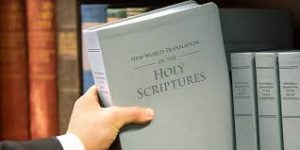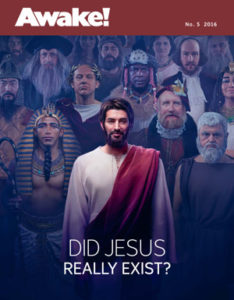 On their website, jw.org, the Watchtower Society asks, ‘Is The New World Translation Accurate?’ It is a good question. The Bible speaks to our deepest concerns, explains our purpose in the world, and introduces us to the God who made us. Every movement that seeks to identify itself with Christ claims to get its teaching and authority from the Bible. It is vital, then, that every such claim is tested. What is the Watchtower apologetic for their translation?
On their website, jw.org, the Watchtower Society asks, ‘Is The New World Translation Accurate?’ It is a good question. The Bible speaks to our deepest concerns, explains our purpose in the world, and introduces us to the God who made us. Every movement that seeks to identify itself with Christ claims to get its teaching and authority from the Bible. It is vital, then, that every such claim is tested. What is the Watchtower apologetic for their translation?
A good working knowledge of the Bible and how it has come down to us equips us to test and challenge Watchtower claims. They acknowledge, ‘some people have commented on or questioned the accuracy of the JW Bible because in places it differs from other translations of the Bible,’ then ‘explain’ why:
- Reliability. The New World Translation is based on up-to-date scholarly research and the most reliable ancient manuscripts. In contrast, the King James Version of 1611 was based on manuscripts that were often less accurate and not as old as those used in producing the New World Translation.
The Watchtower Society give the impression that the ‘modern’ JW Bible is bound to be reliable because of the more numerous and older texts available to the translators. But that misses the point entirely. Those texts are available to all Bible translators and yet none come up with some of the egregious errors found in the JW Bible. It is not the resources available that are in question but what translators do with those resources.
Their interfering with the text to import their own peculiar interpretation negates their claim and makes even the 400 year old King James Version more reliable than their very latest (2013) version. One important example is their ‘translation’ of Phillipians 2:5-7:
‘Let this mind be in you, which was also in Christ Jesus: Who, being in the form of God, thought it not robbery to be equal with God: But made himself of no reputation, and took upon him the form of a servant, and was made in the likeness of men.’ (KJV)
‘Keep this mental attitude in you that was also in Christ Jesus, who, although he was existing in God’s form, gave no consideration to a seizure, namely, that he should be equal with God. No, but he emptied himself and took a slave’s form and became human.’ (NWT)
It is an excruciating translation that obscures rather than illuminates the meaning of the text. In the KJV Paul highlights Jesus’ superior nature, having equality with God (6) but then putting off his divine nature to become a man (v7). ‘Thought it not robbery to be equal with God.’ In other words, his being equal with God did not in any way rob God.
In the JW Bible the thought is muddled, Jesus is demoted, not thinking he should be equal to God. ‘…gave no consideration to a seizure, namely, that he should be equal with God.’ In other words, didn’t consider seizing equality with God, which would rob God. But if he is a slave because in a slave’s form surely he is God if he is in God’s form? A conservative modern translation from the oldest, most reliable manuscripts, agrees with the KJV:
‘Have this mind among yourselves, which is yours in Christ Jesus, who, though he was in the form of God, did not count equality with God a thing to be grasped, but made himself nothing, taking the form of a servant, being born in the likeness of man.’ (ESV)
Jesus did not cling to, or grasp, his equality with God but emptied himself of it to become a man. The thought is simple but the JW Bible complicates it in order to deny Christ’s divinity. It is a modern Arianism. They have brought to the text what they believe, making the text fit their preconceptions, rather than allowing the text to inform their faith.
- Faithfulness. The New World Translation strives to convey faithfully the original message that was inspired by God. (2 Timothy 3:16) Many translations of the Bible sacrifice faithfulness to God’s message in favor of following human traditions, for instance by replacing God’s personal name, Jehovah, with titles such as Lord or God.
Note the loaded terminology, ‘strives to convey faithfully the original message.’ Subtext: unlike other translations, which are inadequate. This entry is contrived, simply making an assertion, staking a claim, in order to sneak in the familiar Watchtower bromide about the name of God.
They do not mention any other ‘human traditions,’ and fail completely to mention their own adherence to ‘human tradition’ in using the name Jehovah. It is a made up name that combines the consonants of the Tetragrammaton YHWH and the vowels of the Greek Adonai (Lord) and is a Masoretic tradition that dates no further back than the 12th century.
Indeed, the ‘many translations’ they reference but fail to identify prove more faithful than the JW Bible, which puts the name of God into Bible texts where it was not found in early manuscripts. The thousands of ancient Greek texts they claim to use don’t mention God by name but use the Greek kurios (Lord) and theos (God). They insert ‘Jehovah’ in place of these names, not because the manuscripts give it, but because they believe it should be there. That is not how honest Bible translators work. Honest Bible translators work from the text not to the text.
- Literalness. Unlike paraphrased translations, the New World Translation renders words literally as long as doing so does not result in awkward wording or hide the thought of the original writings. Translations that paraphrase the Bible’s original text may insert human opinions or omit important details.
Irony upon irony! First, the differentiation is to be made between literal translation (formal equivalence, emphasising fidelity to the original text and grammar, which nevertheless and inevitably includes interpretation); dynamic equivalence (giving the text in the receptor language with less emphasis on lexical fidelity but emphasising the faithful translation of meaning); and paraphrase (a restatement of a text, giving the meaning in another form).
What the Watchtower Society does here is take two ‘extremes,’ literal and paraphrase, and compare the latter unfavourably with the former. The irony is in the fact that the JW Bible imports into John 1:1 the indefinite article ‘a’ giving us ‘…and the Word was a God,’ where there is no warrant for it. It represents a striking example of departing from the text to create a scandalous paraphrase that supports their own understanding of Jesus’ identity. The very charge they bring against other translations may be laid against the JW Bible.
Reliability, faithfulness, and literalness sound like just the thing for someone serious about the Bible. If we were to take these claims at face value we might think we have here a good Bible translation, and therein lies the danger. The cults want you to take things at face value, none more so than the Watchtower Bible and Tract Society. These claims, when examined closely, are nothing to do with the integrity of the translation and everything to do with propaganda.
Having compared other translations unfavourably with the JW Bible, the Society now talk up other translations to compare the NWT favourably with them.
- Missing books. In their Bibles, the Roman Catholic and Eastern Orthodox churches include books known by some as the Apocrypha. However, those books were not accepted into the Jewish canon, and it is noteworthy that the Bible says that the Jews were the ones who were “entrusted with the sacred pronouncements of God.” (Romans 3:1,2) Thus, the New World Translation and many other modern Bible translations rightly exclude the books of the Apocrypha.
Its not what you say, its the way that you say it – ‘We have it right along with some others.’ The hero is, of course, the New World Translation, which is made to look as if it is taking the lead. In fact, it has come very late to the game, following the long established example of ‘many other modern Bible translations,’ from the King James Version to the American Standard (both used by the Watchtower Bible and Tract Society) to the NIV and ESV today. If they could write this material without mentioning any other translations and have the same impact they would.
- Missing verses. Some translations add verses and phrases that are not in the oldest available Bible manuscripts, but the New World Translation excludes such added material. Many modern translations either omit those later additions or acknowledge that those additions lack support from the most authoritative sources.
No examples are given, and the reader is left to trust to the Society that this is the case. It is true that modern translations omit ‘added verses and phrases’ such as the familiar Johannine comma (1 John 5:7-8) e.g. the ESV, while others include it in a text note and explain it e.g. the NIV. The same is true of the ending of Marks Gospel.
isn’t it another irony, and a rich one, that Wycliffe’s ambition was to “…defy the Pope and all his laws, if God spare my life, I will make a boy that driveth the plough know more of the Scripture than thou dost.” Yet the WBTS has taken back that priestly role, insisting their translation and understanding alone are to be trusted, condemning other translations, even if by faint praise.
- Different wording. Occasionally, word-for-word translations are unclear or misleading. For example, Jesus’ statement at Matthew 5:3 is often translated: “Blessed are the poor in spirit.” (English Standard Version; King James Version; New International Version) Many find the literal rendering “poor in spirit” to be obscure, while some think that Jesus was highlighting the value of humility or poverty. However, Jesus’ point was that true happiness comes from recognizing the need for God’s guidance. The New World Translation accurately conveys his meaning with the words “those conscious of their spiritual need.”—Matthew 5:3.
Yes, names are named now they can be dismissed as inadequate. The question is why, when the WBTS gives a dynamic equivalence translation its OK, but when other translators do it it risks obscuring the meaning of the text? The truth is, this whole business is an exercise in bigging up the work of the Society. It has nothing to do with actually informing people, much less encouraging them to go out and find out for themselves. If you have ever tried to hand a piece of literature to a Jehovah’s Witness you will know how constrained they are in their ability to truly explore the Bible for themselves. The iron grip the Society keeps on its people can make the popes and prelates they so readily condemn seem benign by comparison.
Awake! Its Christmas
 Unusually, the Jehovah’s Witnesses called recently. Reluctant to speak to my wife, they pressed a copy of Awake! into her hands and scurried off down the path to their next call before she could wish them compliments of the season. The main article, featured on the front, asked the question Did Jesus Really Exist? It occurred to me that at this time of year, while churches across the world can talk to people about Christ’s advent, Jehovah’s Witnesses don’t have this opportunity. Given the season they must find something to say and so they settled for an account of his historicity.
Unusually, the Jehovah’s Witnesses called recently. Reluctant to speak to my wife, they pressed a copy of Awake! into her hands and scurried off down the path to their next call before she could wish them compliments of the season. The main article, featured on the front, asked the question Did Jesus Really Exist? It occurred to me that at this time of year, while churches across the world can talk to people about Christ’s advent, Jehovah’s Witnesses don’t have this opportunity. Given the season they must find something to say and so they settled for an account of his historicity.
I checked the next edition, which was the last (Christmas?) edition of the year, and the cover story was about Disease while, tucked away at the back like some dark secret was a piece about Christmas. It is a pagan custom, it wasn’t his birthday, fun is Saturnalian, lights are superstitious, mistletoe Druidic, and trees are positively idols. I felt quite put out and depressed about the whole thing so I turned back to the magazine they had left to find some encouragement.
Various authority figures were quoted – Michael Grant, Rudolf Bultman, Will Durant, Albert Einstein, all attesting to the existence of Jesus. Historical characters, such as Tacitus, Suetonius, Pliny the Younger, Flavius Josephus, and even the Talmud were cited for evidence that Jesus existed. Archaeological discoveries were pressed into service as the evidence came thick and fast. Then they asked,
Why Does it Matter?
‘The question of Jesus’ existence matters because his teaching matters. For example, Jesus taught people how to live happy, fulfilling lives.’
Yes, but what about the cross (sorry, torture stake?)
‘He also promised a time when mankind will live in true peace and security, united under a single world government called the Kingdom of God.’
Sounds amazing, but how do I get there?
‘What will Kingdom rule mean for mankind? Consider the following:
-
Warfare and civil strife will cease.—Psalm 46:8-11.
-
Wickedness, including greed and corruption, will be gone forever, along with ungodly people.—Psalm 37:10,11.
-
The Kingdom’s subjects will enjoy meaningful, productive work.—Isaiah 65:21,22.
-
The earth will fully recover from its present sick state and produce bountiful crops.—Psalm 72:16;Isaiah 11:9.’
It all sounds splendid, of course, but will you give me no clue as to how I might get to live in this new world? I felt like Pilgrim at the beginning of Bunyan’s great work, reading, getting agitated, but having no one to guide me further. Then, in a footnote, For more information about Jesus and his teachings go to www.jw.org and look under BIBLE TEACHINGS>BIBLE QUESTIONS ANSWERED.
Down the rabbit hole I went and found a whole new list:
Is the Trinity Doctrine in the Bible?
Is God an Impersonal Force?
Does God live in a specific location?
Does God have a name? and so forth…
Finally, I found Jesus mentioned, clicked on the link and found…another list:
Do Scholars believe that Jesus existed?
Was Jesus Just a Good Man?
Is Jesus Almighty God?
Did Jesus Die on a Cross? and so forth…
Finally, at the bottom of the list, the twelfth item, I found:
How is Jesus Christ a ‘Ransom for Many’?
Good News! A ransom has been paid, redemption is available, our sins are dealt with:
‘This explains how the death of one man can pay the ransom for many sinners. In fact, Jesus’ sacrifice is “a corresponding ransom for all” those who take the steps necessary to benefit from it.’
What steps? Another article, another list. (Yes, I know, right?)
What is the Ransom? How can you benefit from it?
The ransom is Jehovah’s means to deliver humankind from sin and death.—Ephesians 1:7.
-
Jehovah provided the ransom by sending his only-begotten Son to earth to die for us.—1 John 4:9,10.
-
By means of the ransom, we gain the forgiveness of sins, a clean conscience, and the hope of everlasting life.—1 John 1:8,9.
-
We show that we appreciate the ransom by getting to know Jehovah, by exercising faith in Jesus’ ransom sacrifice, and by attending the Lord’s Evening Meal.—John 3:16.
In other words, by joining, attending, using God’s name, becoming a Jehovah’s Witness with all that involves. A gospel of works then and buried deep inside the bowels of the website.
I am glad we keep Christmas. I am glad we talk about the babe born in a manger to die on a cross. Glad we get to the point and speak of people’s sin and need of a Saviour, about God’s scandalous generosity in giving us his son, of his mercy and love in being ready to forgive our sin and open rebellion. About his promise of a new life, powered by a new heart, and informed by a renewed mind. I am glad we speak openly and without hesitation of Jesus’ power over sin and death, and of the fact that he, and not an organisation, is the way, the truth, and the life. I am glad Christmas makes us a glad and thankful people and sorry that Jehovah’s Witnesses don’t share in our joy.
Give a Jehovah’s Witness a gift this Christmas. The gift of a warm smile, a cheerful heart. a patient attitude, and a kind word about Jesus.

